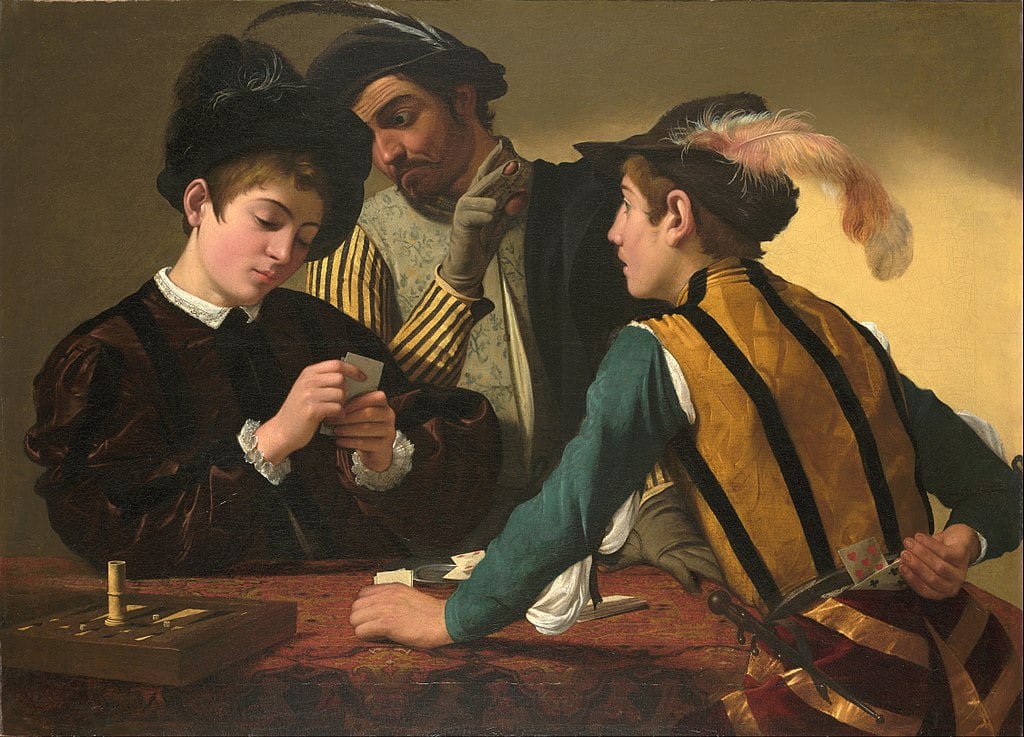Rogue, Gambler

Life is full of risks.
The Quintessential Rogue
Author Michael Mearls
Publisher Mongoose Publishing
Publish date 2002
A freak accident can prove just as deadly as an orc ambush or a rampaging red wyrm. Most adventurers seeks to cut down the risks they face to the greatest degree possible while preserving their shot at fame and fortune. The gambler is the exact opposite. To him, risks are life. He loves hanging on the edge of a single roll of the bones or draw of the cards, wagering his possessions and often his life in daredevil schemes that promise utter ruin or legendary success. The gambler feels that life has enough dangers that you might as well risk everything for a shot at it all. He lives life to the fullest, squeezing as much excitement and danger from each day as possible in his reckless quest to seize the one final prize that sets him up for life.
Adventuring: Many gamblers find adventures coming to them, especially when they fall neck-deep into debt with a criminal cartel or other dangerous organisation. Most gamblers lose money faster than they earn it, rarely managing to go more than a few months without piling up a sizeable tab at a thieves guild-managed dice game or gambling house. Thus, many gamblers head out on adventures in hopes of finding enough wealth to settle their debts. Other gamblers see adventures as large-scale games of chance, with their lives as the stakes and untold riches the prize.
Role-Playing: While gamblers love to take risks, they are not usually foolish or rash. It’s a rare gambler who hasn’t carefully weighed the odds and calculated the potential loss and gain presented by each course of action. The gambler’s willingness to take on a long shot in hopes of cashing in a huge payoff is what sets him apart from other rogues. Gamblers tend to put on a reckless, fearless front, but often this masks a cold, calm, calculating demeanour. After a lifetime of living on the edge, gamblers are cool, collected, and rattled only by the most dire circumstances. Some find the gambler’s seeming detachment and calm infuriating, failing to realise that while the gambler looks like he has no idea of the stakes involved in a situation, in reality he knows all too well the stakes at hand.
Bonuses: Gamblers are known for their luck. Despite the wild risks they take and the danger they court, they always seem to come out ahead of the game. Of course, rarely are stories and rumours of failed gamblers interesting or dramatic enough for the bards to repeat. However, what others see as luck is in reality the gambler’s finely tuned sense of the odds. Once per day, the gambler can judge the odds before making a skill check. Before rolling the dice, the Games Master tells you the DC of the check. If you use this ability before making an opposed skill check, your opponent rolls his result before you decide to make your skill check. If you opt not to make a check, you may choose a different course of action. In the case of an opposed skill check, your opponent does not use an action making his theoretical skill check and may react as normal to your action.
Gamblers, at least the ones good enough to survive for any stretch of time, also possess a lucky streak. The gambler gains a +1 bonus to all saving throws.
Penalties: Most gamblers take their chances at a card table, not in combat. While they know enough about fighting to defend themselves, their combat skills are not as well-refined as most other rogues. Gamblers receive the sneak attack ability at third level rather than first, gaining one fewer sneak attack damage dice than a standard rogue of equal level possesses. In addition, gamblers lack the wide range of experiences of most rogues, gaining six times four skill points at first level and six more at each additional level, modified by Intelligence as normal.
Simple Gambling Rules: Of course, a player who chooses the gambler concept probably at some point tries to wager a few coins in a game of chance. To simulate a game of poker or other Bluffing game, allow each participant to make one of the following rolls: a Wisdom, Intelligence, or Charisma check or a Bluff, Profession (gambler), or Sense Motive skill check. Bluffing games require a careful eye for reading others (Wisdom), an ability to judge the cards in play (Intelligence), or the chutzpah necessary to Bluff others (Charisma). Each participant keeps his result secret and then engages in a round of increased bidding. Other games, such as craps or blackjack, require both the dealer and gambler to select one of the six checks listed for poker and make opposed rolls.

 Buy me a coffee
Buy me a coffee